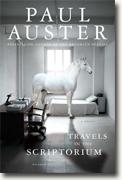Travels in the Scriptorium
Paul Auster
book reviews:
· general fiction
· chick lit/romance
· sci-fi/fantasy
· graphic novels
· nonfiction
· audio books
· author interviews
· children's books @
curledupkids.com
· DVD reviews @
curledupdvd.com
newsletter
win books
buy online
links
home
for authors
& publishers
for reviewers

 |
Travels in the Scriptorium Paul Auster Picador Paperback 160 pages December 2007 |
|
Click here to read reviewer Norma J. Shattuck's take on Travels in the Scriptorium. Paul Auster is a long-published – and highly regarded - poet, novelist, essayist, memoirist and screenplay writer. His novels are always unpredictable yet somewhat predictable at the same time. The reader can count on him to be a brilliant writer, an imaginative soul, a left-of-center thinker. He displays a prodigious vocabulary. He dislikes clichéd plots, “ordinary” middle-class life, conventional endings.
These are all true in Travels in the Scriptorium The horse is not important - he never makes an appearance. But the novel is about one room (presumably like the one on the cover), and one inhabitant of that room, an old man. (By the way, "scriptorium" comes from the Latin and means literally “a place for writing.”) In the room are basic necessities, some historic documents and lots of old photographs. The novel is about isolation, memory and a mystery that slowly unravels. Who is the man? We never know for sure, and the man doesn’t remember much, although more as the story unwinds. One thing is certain: he’s being kept hostage by a group of people, many of whom he greatly harmed during his lifetime. He feels a tangible sense of guilt, but he is not sure about what. “Perhaps he has always been here; perhaps this is where he has lived since the day he was born. What he knows is that his heart is filled with an implacable sense of guilt,” relates the third-person narrator, who remains unknown. He most certainly committed atrocities, in a place called “the Confederation” (aka the U.S.), but he doesn’t recall them. He sent people on various missions: “How many people have I sent out?” he asks Anna, one of his caregivers. “Hundreds, Mr. Blank,” she responds. “More people than I can count.” He may have greatly loved, but he is not sure when or whom. He doesn’t even recall his own name, so he comes to be known, even to himself, as Mr. Blank. He can still read, speak, and sometimes write a small passage. He can still become sexually aroused. But who is he, and why is he in this small room? Where is the room – an asylum, hospital, prison? Every day people visit this man. Most interrogate him, trying to bring back his history and deeds. They have all known him, and he begins to recognize small characteristics of each. His most important visitor is Anna. She admits she loves Mr. Blank, but who is or was she in his life? Was she his wife or his daughter? Did he send someone in her family on a mission? He begins to remember her, and readers will remember her as one of the kindest people in the man’s terrifyingly circumscribed life. She feeds him, administers to his bodily needs and even lets the elderly man kiss her – and more - on one occasion. Mr. Blank remains a functioning man, in at least average physical health, but why can’t he remember more of his personal story? Is his loss of memory an illness, amnesia , or the result of the variety of drugs he is given daily? As is true in other Auster novels, dreams are significant. Reminiscent of some short stories by Truman Capote, in which dreams also play a key role, one of his visitors, Mr. Flood, begs Mr. Blank to “recall the content of that dream,” a dream he once shared with the old man. “My whole life depends on its. Without that dream, I’m nothing, literally nothing.” Unlike many of Auster’s other novels, this did not keep me hanging on every word. Like much of his previous work, the novel is mysterious, engaging and chilling. But, in the end, Travels in the Scriptorium Originally published on Curled Up With A Good Book at www.curledup.com. © Deborah Straw, 2007 |
| Also by Paul Auster: |
|
|
|
 Click here to learn more about this month's sponsor! |
|
| fiction · sf/f · comic books · nonfiction · audio newsletter · free book contest · buy books online review index · links · · authors & publishers reviewers |
|
| site by ELBO Computing Resources, Inc. | |
 His latest novel,
His latest novel,